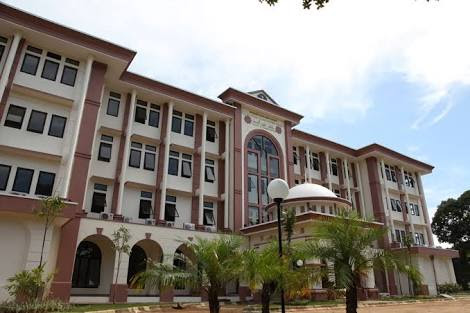THE INFLUENCE OF THE APPLICATION OF THE THINK PAIR SHARE (TPS) COOPERATIVE LEARNING MODEL ON STUDENTS' REASONING ABILITY AND MATHEMATICAL ABSTRACT ABILITY
PENGARUH PENERAPAN MODEL PEMBELAJARAN KOOPERATIF THINK PAIR SHARE (TPS) TERHADAP KEMAMPUAN PENALARAN SISWA DAN KEMAMPUAN ABSTRAK MATEMATIS
Abstract
This study aims to determine how the effect applying the think pair share learning method has on the reasoning and mathematical abstraction abilities of class X students of SMA Negeri 9 Makassar. This study used a quantitative approach with the type of experimental research using a quasi-experimental research design with a non-equivalent control group design. The population in this study were all 290 class X students of SMAN 9 Makassar. The sample in this research was an experimental class of 36 people and a control class of 36 people. The instrument in this study was a test to measure reasoning abilities and mathematical abstraction in the form of a pretest and posttest. The data analysis technique used is descriptive statistical analysis and inferential statistical analysis, namely the multivariate analysis of variance (manova) test. The results of this study indicate that: (1) The average results of students' mathematical reasoning abilities in the experimental class and the control class increased. (2) The average results of students' mathematical abstraction abilities in the experimental class and the control class increased. (3) There is an influence of the TPS type cooperative learning model's application on the reasoning and mathematical abstraction abilities of SMA Negeri 9 Makassar class X students. (4) There is an effect of applying the TPS type cooperative learning model to the mathematical reasoning abilities of SMA Negeri 9 Makassar class X students. (5) There is an effect of applying the TPS type cooperative learning model to the mathematical abstraction abilities of SMA Negeri 9 Makassar class X students.
Downloads
References
Ariati, C., & Juandi, D. (2022). Kemampuan penalaran matematis: systematic literature review. LEMMA: Letters of Mathematics Education, 8(2), 61–75. https://doi.org/10.22202/jl.2022.v8i2.5745.
Azizah, D. N. (2016). Analisis kemampuan abstraksi siswa kelas X ditinjau dari gaya belajar. Universitas Muhammadiyah Purwokarto.
Chianson, M. M., O’kwu, I. E., & Kurumeh, M. S. (2015). Effect of think-pair-share strategy on secondary school mathematics students’ achievement and axademic self-esteem in fractions. American International Journal of Contemporary Scientific Research, 2(6), 141–147.
Febriyanti, A. T., Marethi, I., & Jaenudin. (2017). Pembelajaran kooperatif tipe think pair share dengan menggunakan catatan kecil untuk meningkatkan kemampuan penalaran matematis siswa SMP. JPPM (Jurnal Penelitian Dan Pembelajaran Matematika), 10(2). https://dx.doi.org/10.30870/jppm.v10i2.2041.
Fidrayani, & Fauzia, N. (2017). The Implementation of think pair share on learning outcomes and self-efficacy in fourth grade SD Muhammadiyah 12 Pamulang. International Conferences in Education in Muslim Society. https://doi.org/10.2991/icems-17.2018.55.
Ismail, M. I. (2012). Orientasi baru dalam ilmu pendidikan. Makassar: Alauddin University Press.
Jannah, M., Paridjo, & Utami, W. B. (2019). Analysis the ability of mathematic connection with cooperative learning model thinking pair share and thinking pair square. Mathematics Education Journals, 3(1), 9–16. https://doi.org/10.22219/mej.v3i1.8415.
Konita, M., Asikin, M., & Asih, T. S. N. (2019). Kemampuan penalaran matematis dalam model pembelajaran connecting, organizing, reflecting, extending (CORE). PRISMA, Prosiding Seminar Nasional Matematika, 2, 611–615. Retrieved from https://journal.unnes.ac.id/sju/index.php/prisma/article/view/29072.
Natalliasari, I. (2015). Meningkatkan kemampuan penalaran matematis siswa madrasah tsanawiyah melalui penerapan model pembelajaran kooperatif tipe think pair share. JP3M (Jurnal Penelitian Pendidikan Dan Pengajaran Matematika), 1(1), 33–40. https://doi.org/10.37058/jp3m.v1i1.140.
Nita, N., & Surya, E. (2017). Membangun kemampuan penalaran matematis (Reasoning mathematics ability). ResearchGate, December.
Nurhasanaha, F., & Sumekar, W. (2019). Context design for analyzing students’ abstraction with different cognitive styles in learning tangent lines of circles. AIP Conference Proceedings, 2194(020074). https://doi.org/10.1063/1.5139806.
Nurhikmayati, I. (2017). Kesulitan berpikir abstrak matematika siswa dalam pembelajaran problem posing berkelompok. KALAMATIKA Jurnal Pendidikan Matematika, 2(2), 159–176. https://doi.org/10.22236/kalamatika.vol2no2.2017pp159-176.
Nurwijayanti, L. A. (2019). Pengaruh kemampuan penalaran terhadap pemecahan masalah phytagoras siswa kelas VIII SMP Negeri 2 Kepohbaru [Ikip PGRI Bojonegoro]. Retrieved from http://repository.ikippgribojonegoro.ac.id/113/.
Subkhi, W. (2018). Meningkatkan minat dan prestasi belajar matematika metode think, pair, share materi SPLTV pada siswa masrasah aliyah. Wiyata Dharma: Jurnal Penelitian Dan Evaluasi Pendidikan, 6(2), 195–199. https://doi.org/10.30738/wd.v6i2.3400.
Warsito, & Saleh, H. (2019). Analisis abstraksi matematis melalui matematisasi progresif dengan pembelajaran matematika realistik pada pembelajaran geometri. Jurnal Umt, 198–206.
Yusepa, B. (2016). Kemampuan abstraksi matematis siswa sekolah menengah pertama (SMP) kelas VIII. Symmetry: Pasundan Journal of Research in Mathematics Learning and Education, I(1), 54–60.
Zaskia, F. (2016). Meningkatkan kemampuan abstraksi matematika siswa SMP melalui pembelajaran kooperatif think pair share (TPS).
Copyright (c) 2022 Ahmad Farham Majid, Muhammad Mursyid Munir, Mardhiah, Fitriani Nur, A. Sriyanti

This work is licensed under a Creative Commons Attribution 4.0 International License.

